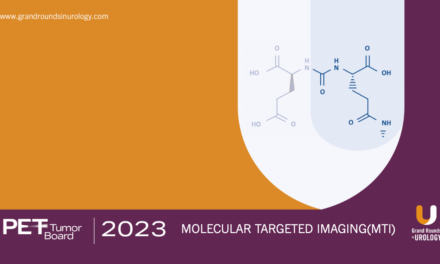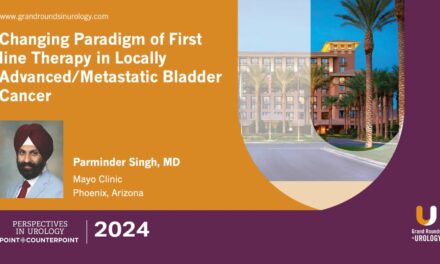Jason A. Efstathiou, MD, DPhil, FASTRO, FACRO, presented “Current State of the Art in Bladder-Preserving Trimodality Therapy for Muscle-Invasive Bladder Cancer” during the 24th Future Directions in Urology Symposium in August 2024 in Colorado Springs, Colorado.
How to cite: Efstathiou, Jason A. “Current State of the Art in Bladder-Preserving Trimodality Therapy for Muscle-Invasive Bladder Cancer.” August 2024. Accessed Sep 2025. https://grandroundsinurology.com/current-state-of-the-art-in-bladder-preserving-trimodality-therapy-for-muscle-invasive-bladder-cancer/
Current State of the Art in Bladder-Preserving Trimodality Therapy for Muscle-Invasive Bladder Cancer – Summary
Jason A. Efstathiou, MD, DPhil, FASTRO, FACRO, emphasizes the growing interest in bladder preservation therapies as an alternative to radical cystectomy for muscle-invasive bladder cancer (MIBC). While cystectomy remains an effective treatment, it is not performed in about half of eligible patients. Trimodality therapy (TMT), combining maximal transurethral resection (TUR), chemotherapy, and radiation, offers a promising bladder-sparing approach.
In this 11-minute presentation, Dr. Efstathiou compares outcomes between TMT and cystectomy, showing no significant difference in metastasis-free or cancer-specific survival. A shift toward biomarker-driven management is also highlighted, with specific markers, such as MRE11 and immune signatures, indicating better responses to chemoradiation. Immunotherapy is increasingly integrated into treatment regimens, with promising trials like SWOG 1806 exploring the addition of immune checkpoint inhibitors to chemoradiation.
TMT, now recognized by major guidelines, offers patients a viable option with preserved bladder function, improved quality of life, and less life interference. The presentation stresses the need for improved staging, expanded access to bladder-sparing options, and informed decision-making to optimize outcomes for MIBC patients.
The Future Directions in Urology Symposium (FDUS) is an annual urology think tank and non-CME educational summit that brings together industry figures and experts to discuss the current state of genitourinary care and define future directions in treatment. Dr. Dreicer delivered this educational activity during the 24th iteration of the meeting in August 2024 in Colorado Springs, Colorado.
ABOUT THE AUTHOR
Jason A. Efstathiou, MD, DPhil, is Professor of Radiation Oncology at Harvard Medical School (HMS) as well as Director of the Genitourinary (GU) Division in the Department of Radiation Oncology and Clinical Co-Director of the Claire and John Bertucci Center for GU Cancers at Massachusetts General Hospital. He is a recognized leader in the fields of GU malignancies and radiation oncology. Dr. Efstathiou holds a BS from Yale University, an MD from Harvard Medical School, and a DPhil from the University of Oxford. He completed his residency training through the Harvard Radiation Oncology Program.
Dr. Efstathiou’s research has informed clinical guidelines and made novel contributions to innovations such as organ preservation therapy for bladder cancer, technology assessment of proton beam therapy for prostate cancer, indications for and adverse effects of androgen deprivation therapy for prostate cancer, improving radiation therapy for testicular cancer, and global oncology outreach efforts.
In addition to his educational work and his patient care, Dr. Efstathiou holds leadership positions within cooperative groups and professional societies




